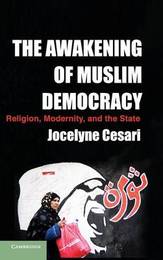
|
The Awakening of Muslim Democracy: Religion, Modernity, and the State
Hardback
Main Details
| Title |
The Awakening of Muslim Democracy: Religion, Modernity, and the State
|
| Authors and Contributors |
By (author) Jocelyne Cesari
|
| Physical Properties |
| Format:Hardback | | Pages:440 | | Dimensions(mm): Height 229,Width 152 |
|
| ISBN/Barcode |
9781107044180
|
| Classifications | Dewey:306.697 |
|---|
| Audience | | Professional & Vocational | | Tertiary Education (US: College) | |
|---|
|
Publishing Details |
| Publisher |
Cambridge University Press
|
| Imprint |
Cambridge University Press
|
| Publication Date |
14 April 2014 |
| Publication Country |
United Kingdom
|
Description
Why and how did Islam become such a political force in so many Muslim-majority countries? In this book, Jocelyne Cesari investigates the relationship between modernization, politics, and Islam in Muslim-majority countries such as Egypt, Iraq, Pakistan, Tunisia, and Turkey - countries that were founded by secular rulers and have since undergone secularized politics. Cesari argues that nation-building processes in these states have not created liberal democracies in the Western mold, but have instead spurred the politicization of Islam by turning it into a modern national ideology. Looking closely at examples of Islamic dominance in political modernization, this study provides a unique overview of the historical and political developments from the end of World War II to the Arab Spring that have made Islam the dominant force in the construction of the modern states, and discusses Islam's impact on emerging democracies in the contemporary Middle East.
Author Biography
Jocelyne Cesari is visiting professor of government and senior research fellow at the Berkley Center for Religion, Peace and World Affairs at Georgetown University.
Reviews'An indispensable guide to the understanding of political Islam by one of Europe's leading analysts. Theoretically sophisticated, this book answers all the big questions.' Roger Owen, Emeritus Professor, Harvard University, Massachusetts 'Jocelyne Cesari not only combines historically rich analysis with admirable geographical breadth and coverage of recent events, she also forces us to view familiar questions through some very new lenses. Rather than approaching political Islam through the prism of social movements and opposition, her starting point is the state and formal institutions. But that is not always her ending point: she shows how and why democracy - if it emerges - is often likely to take some unfamiliar forms in political systems in which political Islam is deeply entrenched.' Nathan Brown, George Washington University 'One of the dominant scholarly assumptions regarding political Islam is the dichotomy between state and religion and between modernization and Islamization. The Awakening of Muslim Democracy turns this dominant hypothesis on its head. It argues that state actions and politics have played a key role in politicizing Islam and that the modernization of Muslim societies did not lead to privatization of religion but rather to the politicization of Islam. By bringing the state back and integrating an institutional approach with the social and individual levels, this book makes a critical contribution to our understanding of religion, modernity, and the state in the Muslim world.' Fawaz A. Gerges, London School of Economics and Political Science, and author of The New Middle East: Protest and Revolution in the Arab World (Cambridge University Press, 2014)
|